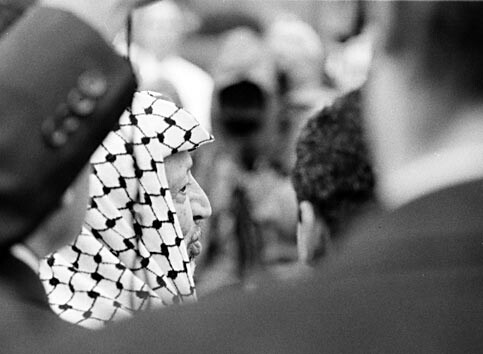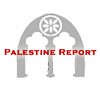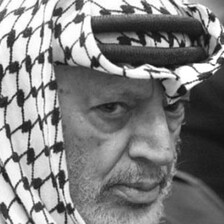Palestine Report 4 November 2004

Arafat (Jamal Wilson)
In the early hours of October 28, as dozens of journalists, mid-rung political officials and curious onlookers milled around outside President Arafat’s Ramallah compound speculating on the health of their leader, one Palestinian reporter evoked critical minutes in the shaping of early Islam. Cynically, he recalled how the Prophet Mohammed’s followers disputed the succession only hours after he lay dead.
It was an acknowledgement of the moment’s import (some believed the president had already passed away) and impending uncertainty. One day later, a frail Arafat was airlifted out of Ramallah, away from the offices in which he had been ensconced for nearly three years under threat of expulsion, and flown to a Paris hospital to determine exactly what caused his collapse.
Reportedly, the president was sipping soup with his top advisors when he vomited and then slipped into unconsciousness on November 27. Doctors in Paris have ruled out leukemia, but a battery of tests has yet to come back conclusive as to the cause of his ailment. Israel has promised that Arafat will be allowed to return to Ramallah once his treatment is finished. Still, statements by Israeli officials reflect their assessment that Arafat has departed the political scene for good.
For Palestinians, the implications of Arafat’s absence are not so clear. At the most grassroots level, no one is currently signing the endless requests for monetary intervention by impoverished faction loyalists that fill the president’s desk and which he alone can approve. While Palestine Liberation Organization number two Mahmoud Abbas, Prime Minister Ahmed Qrei’, and Legislative Council Speaker Rawhi Fattouh have all called meetings of their respective leadership bodies to maintain the appearance of order, no substantive decisions were made at those meetings.
Officials have gone out of their way to avoid the appearance of a coup after media reports at the height of Arafat’s illness said he had approved a triad of Abbas, Qrei’ and Fattouh to govern in his place. Arafat heard this and dispatched Azzam Al Ahmed to publicly refute the news. Until the French doctors pass their verdict, most of the top leadership is carefully maintaining the status quo. Symbolically, Arafat’s chair has remained empty at meetings.
Were Arafat to die, Palestinian law provides that the Speaker of the Legislative Council take the reigns of power for 60 days until elections can be held. The difficulty of holding elections, the relative obscurity of the current Legislative Council speaker, as well as concerns that the strained political system cannot support such an interim period have all inspired speculation that other arrangements may be initiated. Vouching for ongoing PLO prominence as the heart of Palestinian leadership, most observers believe that Abbas would eventually take the reigns.
In the event that Arafat requires extended treatment abroad, however, PLO Executive Committee member Hanna Ameera thinks an uneasy balance of power could persist for as long as a year. The problem, he says, is that this new vacuum has occurred at a time of great pressure in all of the major leadership bodies. Fateh, the president’s faction, has been clamoring to hold elections in its ranks to promote the younger leadership after more than a decade. A host of smaller Palestinian factions are demanding seats in the decision-making bodies of the PLO. Finally, the cabinet is currently discussing the Palestinian election law: when and if presidential and legislative elections will take place.
“Whenever anyone wants to change anything, it will affect the period of coexistence,” says Ameera. And that, he worries, will lead to trouble. “In the past, everything was in the hands of one person. Now it is in the hands of three or four, and those three or four are not entirely in control.”
Initially Abbas seemed to balk at convening the National and Islamic Forces established to guide the Intifada, but also used by Arafat to undermine Abbas’ decisions during his brief stint as prime minister. Abbas was stung by the group’s criticisms after he gave a 2003 Aqaba summit speech seen by many Palestinians as far too compromising. Fears that he would not convene the body, however, set off a panic within smaller factions that have no seat in the PLO but were invited by Arafat to participate in the group. Their fears were allayed when the meeting was eventually held without incident.
From Rafah, further from the official center of power and closer to the encroaching Israeli military, comes another worry. “If Israel were to refuse to allow the president to return,” says one Fateh activist, “this could cause a new escalation. Everyone, young and old, has some emotional connection with Abu Ammar. It could be as significant as Sharon’s visit to Al Aqsa Mosque [that sparked the second Intifada].”
For those who witnessed the meager turnout for the president’s early-morning departure on October 29, it is hard to imagine such fervor. Several Ramallah women who previously participated in rallies outside the president’s offices ascribe the lack of a rousing public send-off to the ongoing fast of Ramadan. Don’t forget, they add, the Palestinian Authority has given us little to support.
Only an Islamist movement backer dismisses fears of a power struggle in the president’s prolonged absence. Metaphorically, he also recalls the death of the Prophet Mohammed, telling the story of how Omar raised his sword to strike down anyone who dared to claim the prophet had breathed a last breath. Abu Bakr rebuked him. “If anyone worships Mohammed,” Abu Bakr reportedly said, “Mohammed is dead. If anyone worships God, God is alive, immortal.”
Slipping easily into Islamist political rhetoric, this man’s message is that the Palestinian struggle is a long one, unfettered by the physical fate of any one man. As the president’s absence is more widely felt, only the political faction able to implement that message will succeed in curbing public unease.
Related Links






